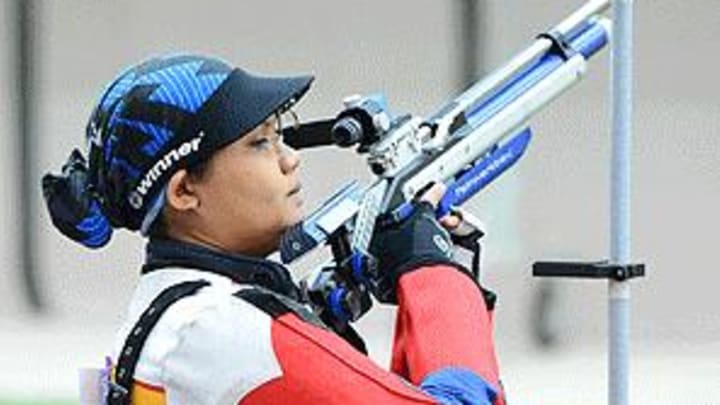Pregnant Nur Suryani Mohd Taibi leaves London with a special record


Even though she didn't advance to the finals of the 10-meter air rifle Saturday morning, Nur Suryani Mohd Taibi managed to shatter a record: most pregnant Olympian ever. The 29-year-old naval logistics officer from Malaysia is nearly eight months pregnant, well farther along than any previous Olympian.
A first time Olympian and first time mother, Suryani, as she prefers to be called, is learning as she goes. When asked if she felt any pain during the morning's competition -- she placed 34th of 56 competitors -- Suryani cocked her head, raised her eyebrows, and answered the question with one of her own: "Is it pregnant women will feel pain?" The gaggle of male journalists suddenly stupefied into silence, Suryani responded to herself. "I don't think so," she said, "or, not yet."
After a transient bout of morning sickness earlier in her pregnancy, Suryani has felt fantastic, she says. And while some shooters try to shoot between heartbeats, Suryani shoots between her daughter's kicks. "I talked to her before shooting," Suryani said. "I told her, OK, don't move so much, behave yourself, Mommy's ready to shoot, help Mommy to shoot."
"I feel only three or four kicks today during the competition," she added. When the kicks came while Suryani's finger was on the trigger, she lowered the rifle, stepped back, took a deep breath, and then took aim again. "She always listens," she says of her daughter.
As to the idea of shooting between heartbeats, only some shooters attempt to employ that strategy, and it probably wouldn't have been a fruitful path for Suryani anyway. "The problem during pregnancy is your resting heart rate goes up," says Dr. Jim Pivarnik, who studies pregnant athletes. "Let's say it's 65 before pregnancy, it could easily be 80 at eight months. So that gives much less time between beats to fire a shot." Olympic shooters wear inflexible canvas and leather pants and coats to deaden the reverberations that their pulse might have on their head or hands.
But Suryani said that she didn't feel disadvantaged in any way, "even though the score is not so high as I expected it to be." As to the heartbeat, she said, cheerfully, "I have two hearts, so maybe I'm stronger." In fact, Suryani suggested that her weighty belly actually made her feel more stable at times when she leaned backward to sight the rifle. "It's balanced in the front and back now," she said.
Says Pivarnik, "the center of gravity in a pregnant woman is definitely a bit lower, there's no doubt about that." But as pregnant women get closer to delivery, they also secrete a hormone called relaxin that loosens the hip joint for delivery. Lisa Leslie, U.S. basketball gold medallist in '08, said at those Games that she felt "unstable" in her hips after giving birth to her daughter. But Suryani, who used the widest stance of any competitor, said she felt fine, and that she adjusted as her belly grew, even getting a custom made shooting suit. "I asked a man in Malaysia to make it so it will fit until I'm eight months pregnant," Suryani said. "He said, OK, I have a wife who is eight months, I can do it in one week!"
As far as any performance effect of pregnancy on shooting, the jury is way out. "It's not like we've done a study and said, 'Let's have every woman who's eight months pregnant shoot and then shoot again when they're not pregnant,'" Pivarnik says.
When Suryani found out she was pregnant in January, her doctor was surprised, she said, but after examining her, decided she could still go to the Olympics. The most precarious part of the journey thus far was probably the flight to London, and that went off without a hitch. For unknown reasons, the pressure change of air travel has a tendency to induce labor in pregnant women. But Suryani appeared immune to any anxiety about giving birth either on the flight or at the Olympics. "I told [my daughter] to wait until we get back to Malaysia, and I think she listens," she said. "If I had to go to a labor room during competition, I just accept it with an open heart...I'm quite stubborn, and when I say I want to go [to the Olympics], I want to go."
Her police officer husband, though ... not so immune to pregnancy anxiety. He's in London with the proverbial hospital bag ready, and Suryani said he's already freaking out. "He said, you better go for a caesarian. I don't want you screaming in pain. I don't want to see you like that, or else I will kick the doctor." If the baby does come in London, Suryani said the Malaysian prime minister pledged to cover the medical costs of delivery.
(Suryani had no answer for a few other bizarre questions she was posed this morning, so here they are: No, Britain does not do as the U.S. does and grant citizenship to any baby born on its soil. And, no, the "international zone" in the athlete's village is not some sort of international embassy inside which newborns instantly become citizens of the Olympics.)
As she left the competition -- officials loaded her into a golf cart -- Suryani smiled and said that she looked forward to telling her daughter "that there's many challenges I had to face to bring you to London, and you were in the Olympics before you were born!"
And so, on to more challenges. Suryani has her heart set on the name: Dayana Widyan. "But my husband wants to put Isabella. But I don't know where. It's already very long!"
